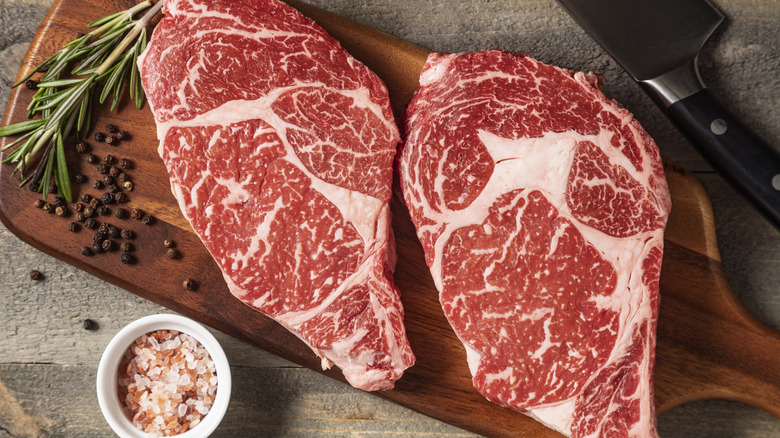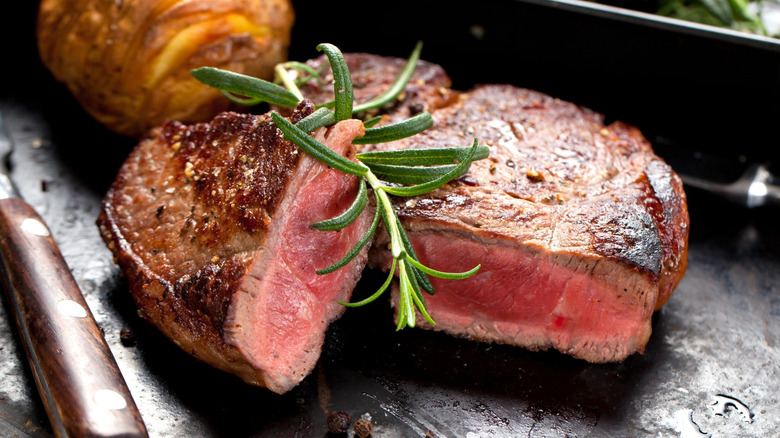No Marinade Needed: Get Ultra Tender Steak With A Simple Brining Method
If you're looking to cook up a tender, flavorful steak, marinating can bring amazing flavors and texture to the table — but it's not the only way. One lesser-used but equally effective way to bring your steak to ultra-tender perfection is brining. To find out how this method works, Food Republic spoke with Sam Hazen, executive chef at Palladino's Steak and Seafood.
Brining and marinating rely on the same principles — soaking the meat to tenderize its texture and enhance flavor — but that's where the similarities end. "Brining focuses on a [saltwater] solution to increase tenderness by increasing the meat's water-holding capacity," Hazen told us. "The salt dissolves some muscle proteins[,] which prevents them from tightening too much during cooking and [keeps] the meat juicy." This makes a huge difference, as during high-heat searing, muscle fibers may contract and push out water, which causes the steak to dry out prematurely.
On the other hand, "Marinating leans on acids or enzymes in things like vinegar, citrus juice, or yogurt to break down muscle fibers and connective tissue," Hazen told us. These elements introduce new flavors to your meat — but this can be a detriment. Steaks are prized for their natural flavor, so brining is an alternative way to tenderize the meat without dramatically changing its flavor profile. Also, the acidic molecules in a marinade only penetrate the surface of the meat. In contrast, the salt used in brining is small enough to pass throughout the entirety of the meat, providing evenly distributed, subtle flavor and tenderness throughout. If you're still looking to use a marinade, consider using salty condiments for deeper penetration of flavors – think soy sauce or Worcestershire.
Tips and tricks for a perfect brine
Salt brining is a lesser-used method by home chefs, but it's just as easy as marinating. You can also skip a trip to the grocery store, as you'll probably be able to find the ingredients you need already in your kitchen: salt, sugar, and water – salty fish sauce is a great brining liquid, as it already contains these elements. According to Sam Hazen, the ideal salt-to-water ratio is "one cup kosher salt, ¼ cup sugar, to one gallon of water." Salt and water create the osmosis process, which causes the salt to penetrate the meat, while the sugar caramelizes when seared to create a flavorful, golden crust.
Remember — no two steaks are the same, and any steak expert will know that cuts like ribeyes need to be cooked at a higher temperature than filet mignon due to differences in leanness and intramuscular fat. These factors also affect how a steak holds up to brining. According to Hazen, you should avoid brining tough, lean cuts, as well as tender, well-marbled cuts too — but for opposite reasons. The tough, collagen-rich cuts don't need moisture retention to become tender, and instead benefit from slow-and-low cooking methods that allow their collagen to turn into gelatin, making them fork tender. On the other hand, well-marbled, tender cuts already retain moisture excellently as the fat renders out and bastes the meat during cooking, so a brine can cause too much moisture retention, causing the meat to go soft and mushy. Lastly, for extra juiciness, always remember to let your steak rest after cooking.


